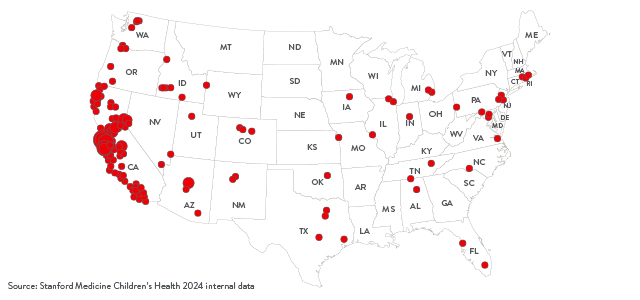Contact us
If you would like to learn more or if you are ready to make an appointment, please call or contact our team.
Notice of West building lobby closure at Lucile Packard Children’s Hospital Stanford
In our Pediatric Inflammatory Bowel Disease (IBD) Program at Stanford Medicine Children’s Health, we are committed to achieving the very best outcomes for your child. While there is currently no IBD cure, the next best thing is remission—when the disease is inactive and your child isn’t experiencing symptoms. As one of the largest and most comprehensive IBD centers on the West Coast, we are pleased to participate in the ImproveCareNow Network, which sets the gold standard of IBD care for pediatric hospitals nationwide.
The graphics below provide a good understanding of our most recent IBD care achievements and outcomes, as reported by ImproveCareNow. We follow ImproveCareNow’s Model Care Guidelines and also create our own evidence-based guidelines, to ensure that your child receives consistent, high-quality care for IBD. Below, we present our IBD data on volumes, remission, steroid use, and the nutrition and growth outcomes for our pediatric patients.

In 2024, we cared for 780 unique patients, many of whom had multiple visits. This number is comparable to those of other large IBD centers in the West. By seeing a high volume of patients, we have developed deep expertise in common, complex, and rare IBD, and we offer extensive health care services for children with IBD and their families.

In 2024, our large and diverse IBD care team managed 2,019 individual patient visits. Each year, our volumes grow, and since 2021, our program has increased the total visit volume by 14.4%. Our gastroenterology doctors within our Pediatric Inflammatory Bowel Disease (IBD) Program are recognized for their subspecialty care and often receive requests for second opinions from across the nation.

Families travel from several states across the nation and other countries to receive our innovative, multidisciplinary care in our Pediatric Inflammatory Bowel Disease Program. For example, we are the first in California and one of a handful in the U.S. to offer intestinal ultrasound for children with IBD who require such procedures.
We are continually expanding our access, including telehealth, to bring our exceptional IBD care to more children in our region and beyond.

In 2024, we achieved remission (no active GI symptoms at last visit) in 86% of our patients, which surpasses ImproveCareNow’s target of 83% remission for patients. We also surpassed their target in 2023.

In 2024, we met ImproveCareNow’s target of achieving 60% sustained clinical remission (no active GI symptoms for 12 months or longer) in our patients. We have increased our sustained remission rates over the last three years, and we are pleased to help many of our patients feel better for long periods of time.

While steroids are useful to reduce inflammation, they are best used in the short term due to harmful side effects. We protect our patients’ overall health by getting them off steroids and on to better treatments, including advanced medical interventions, IBD nutritional therapies, and integrative GI therapies. The chart above shows that 98% of our patients were steroid-free in 2024.

In 2024, 91% of our patients achieved satisfactory growth and nutrition status. While this has always been a strong point for our center, we have increased growth and nutrition status rates over the last few years, including a 6% increase in nutrition in 2024. At Stanford Children’s, we offer the latest evidence-based IBD nutritional therapies, including all special disease-focused diets. Adequate nutrition supports the healing process after a flare or a new diagnosis of an active disease, and it enables children to develop typically, feel well, and grow.
To achieve exceptional outcomes, we tailor care to every patient; offer the latest diagnostic tools such as intestinal ultrasound; and provide traditional, integrative, and interdisciplinary (whole child) care options. To support families, we offer psychosocial services, support groups, and community connection (connecting you with other IBD families and organizations).
We also develop innovative therapies via clinical trials and research so that children have access to the latest care, such as noninvasive diagnostic techniques, new medicines, and extra support to improve symptom management.
To keep your child healthy over time, we provide timely follow-up care, a health maintenance dashboard for whole-body health checks and built-in goals, and expert IBD support as your child becomes a young adult and transitions to adult IBD care at Stanford Health Care.
Learn more about our comprehensive care for children with IBD >
Connect with us:
Download our App: